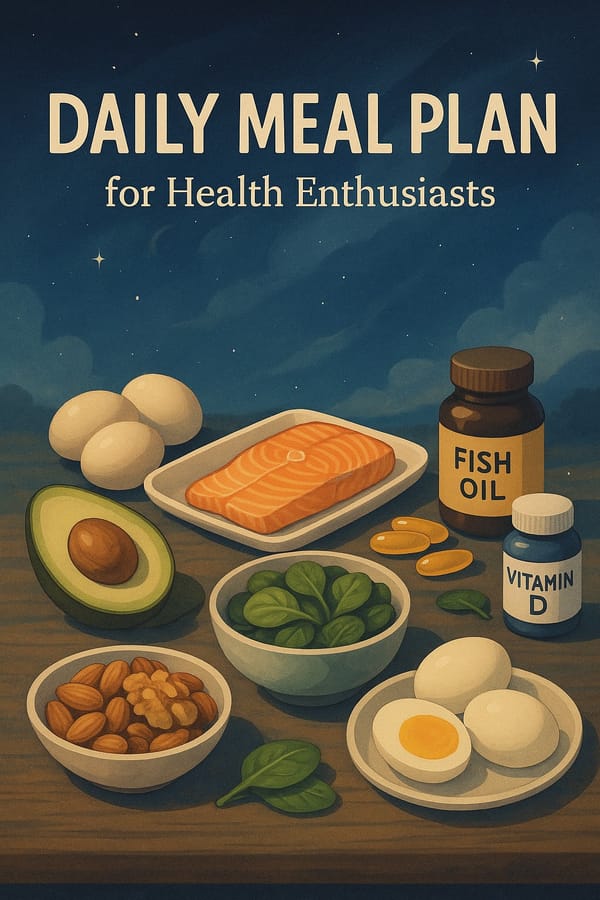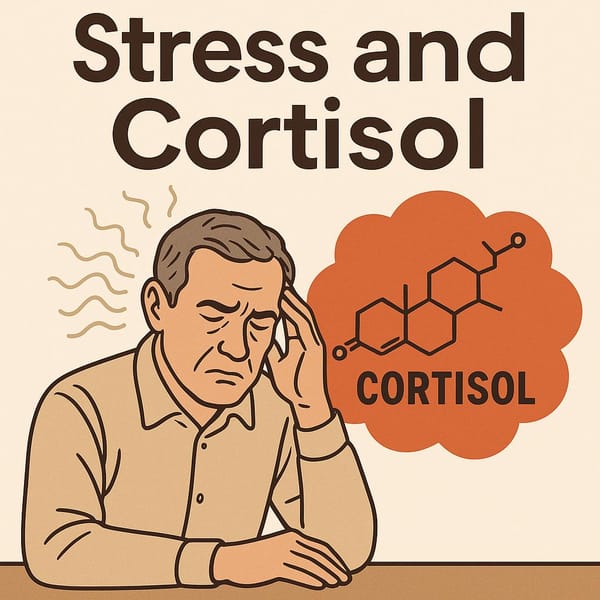Autophagy: The Key to Cellular Renewal, Healthy Aging, and Chronic Disease Prevention
Discover how autophagy—your body’s built-in recycling system—helps slow aging, reduce chronic disease risks, and support overall vitality, especially for those 50 and older. Learn practical tips on intermittent fasting, exercise, and dietary choices to maximize this powerful cellular process.

Introduction
Ever wonder why some people manage to maintain robust health and a youthful appearance even as they enter their 50s or beyond? Scientific research in recent years has brought attention to a fundamental cellular process that plays a pivotal role in slowing cellular aging and reducing the risk of chronic diseases: Autophagy. Often referred to as the body’s built-in recycling system, autophagy (from Greek words “auto,” meaning “self,” and “phagy,” meaning “eat”) helps cells remove and recycle damaged components, thus promoting renewal and maintaining optimal cellular function.
This article delves into the scientific underpinnings of autophagy, examining how it impacts overall health, especially for those in their 50s or older. You’ll find evidence-based insights on activating and optimizing autophagy through dietary patterns, exercise, and lifestyle adjustments.
Understanding Autophagy
1. Definition
Autophagy is a cellular mechanism by which cells degrade and recycle their own components, such as misfolded proteins, dysfunctional organelles, or damaged cell parts. By forming a double-membrane vesicle called an autophagosome, these unwanted cellular materials are transported to lysosomes, where they’re broken down into molecules that can be reused to support healthy cell function.
2. Why It Matters
- Cellular Clean-up: Autophagy rids cells of harmful waste, reducing the buildup of protein aggregates that contribute to neurodegenerative diseases like Alzheimer’s and Parkinson’s.
- Enhanced Cellular Efficiency: Clean, well-functioning cells have better energy production and can handle everyday stress more effectively.
- Anti-Aging Benefits: Research in yeast, mice, and other organisms shows that stimulating autophagy can extend lifespan by minimizing cellular damage over time.
- Anti-Inflammatory: By removing inflammation-triggering debris, autophagy helps reduce chronic inflammation—a key factor in many metabolic and cardiovascular diseases.
(References: Cell Metabolism, Nature Reviews Molecular Cell Biology, Journal of Clinical Investigation)
How Autophagy Works
1. Autophagosome & Lysosome
- Autophagosome: A specialized vesicle that engulfs damaged proteins and organelles.
- Lysosome: Contains acidic enzymes that break down these materials into simpler molecules, which can then be recycled and reused by the cell.
2. The mTOR Pathway
mTOR (Mechanistic Target of Rapamycin) serves as a nutrient sensor. When nutrients are abundant, mTOR activity is high, suppressing autophagy. Under nutrient-deprived conditions (such as fasting), mTOR is inhibited, allowing autophagy to commence.
3. AMPK
AMPK, another critical energy sensor, detects low ATP levels or energy deficits—often triggered by exercise or caloric restriction—and stimulates autophagy to help cells adapt and utilize stored energy sources more effectively.
(References: Science Translational Medicine, Journal of Cell Science)
Health Benefits of Autophagy
1. Delaying Cellular Aging
Studies in various model organisms demonstrate that consistent autophagy activation helps prolong lifespan and delay age-related cellular deterioration. In humans, robust autophagy is linked to better cellular health, potentially reducing age-associated ailments.
2. Preventing Chronic Diseases
- Heart Disease: By eliminating damaged proteins and reducing oxidative stress in blood vessels, autophagy supports cardiovascular health.
- Type 2 Diabetes: Autophagy may improve insulin sensitivity by optimizing how muscle and liver cells process glucose.
- Neurodegenerative Disorders: Clearing out protein aggregates may slow or reduce the risk of Alzheimer’s and Parkinson’s.
3. Strengthening the Immune System
Well-regulated autophagy allows immune cells (like white blood cells) to efficiently destroy pathogens and reduce autoimmune dysfunction.
4. Muscle Repair
Autophagy plays a role in repairing microtears in muscle fibers after workouts, promoting better muscle recovery and growth.
(References: Journal of Gerontology, The American Journal of Pathology)
Why It’s Crucial for Those 50+
- Brain Health: Proper autophagy helps rid the brain of abnormal protein deposits, lowering the risk of cognitive decline.
- Heart Health: Supporting arterial elasticity and reducing plaque buildup through cellular clean-up can be vital for cardiovascular health.
- Weight and Metabolism Management: Since metabolic rate tends to slow with age, autophagy helps optimize energy usage, preventing excessive fat storage.
- Immune Support: Strengthening immune response becomes increasingly important in older adults.
- Cancer Risk Reduction: Efficient removal of damaged or mutated cellular components can decrease the likelihood of abnormal cell growth.
(References: Aging Cell, Frontiers in Pharmacology)
Proven Methods to Stimulate Autophagy
1. Intermittent Fasting (IF)
- Concept: Switching between periods of eating and fasting, commonly 16:8 (fast for 16 hours and eat within 8 hours). Beyond 12 hours of fasting, insulin and blood sugar levels drop, encouraging the body to burn fat and initiate autophagy.
- Advice for Older Adults: Start with milder versions, like 12:12 or 14:10, and listen to your body. Consult a doctor if you have pre-existing conditions.
2. Caloric Restriction (CR)
- Concept: Reduce daily calorie intake by about 20-30% of normal levels, promoting a mild energy deficit.
- Benefits: Encourages the body to tap into stored energy and damaged cellular components, leading to enhanced autophagy over the long term.
3. Exercise
- Cardio (Moderate to High Intensity): Examples include brisk walking, jogging, cycling, or swimming 150 minutes per week.
- Resistance Training: Helps deplete glycogen stores and trigger autophagy for muscle repair.
- Yoga & Stretching: Alleviates stress and may support autonomic balance.
4. Ketogenic Diet
- Concept: Emphasize healthy fats while reducing carbs to about 5-10% of total caloric intake, inducing ketosis.
- Warning: Not suitable for everyone, especially those with liver, kidney, or cholesterol issues. Consult professionals.
5. Quality Sleep
- Importance: Sleep regulates numerous hormones. Insufficient rest elevates cortisol, hindering autophagy.
- Recommendation: Aim for 7-8 hours of uninterrupted sleep, in a dark, cool, and device-free environment.
(References: Journal of Translational Research, Autophagy, International Journal of Molecular Sciences)

Foods That Boost Autophagy
- Antioxidant-Rich Fruits and Vegetables: Berries, leafy greens, tomatoes, carrots.
- High-Quality Protein: Fish (like salmon), eggs, legumes, nuts.
- Healthy Fats: Avocado, extra virgin olive oil, flaxseeds, chia seeds.
- Spices & Herbs: Turmeric (curcumin), ginger, garlic.
- Green Tea & Black Coffee: Contain compounds that may enhance metabolic rate and autophagy when consumed in moderation.
(References: American Journal of Clinical Nutrition, Journal of Nutrition, Journal of Agricultural and Food Chemistry)
Lifestyle Adjustments to Support Autophagy
1. Stress Management
- Deep Breathing: Activates the parasympathetic nervous system.
- Meditation & Yoga: Promotes mental calm, lowers heart rate, and supports the immune system.
- Leisure Activities: Find hobbies or outdoor activities that relieve stress.
2. Sleep Hygiene
- Bedtime Routine: A warm shower, reading, or light music.
- Limit Blue Light Exposure: At least 30 minutes before bed.
- Optimize Room Conditions: Quiet, dark, and comfortably cool.
3. Avoid Smoking & Excessive Alcohol
- Smoking: Damages blood vessels and impairs autophagy.
- Alcohol: Overconsumption strains the liver and increases inflammation.
(References: Molecular Aspects of Medicine, Frontiers in Immunology)
Precautions & Warnings
- Medical Conditions: Diabetics, hypertensive patients, or those with kidney issues should consult a physician before attempting fasting or major dietary changes.
- Pregnancy & Nursing: Nutrient needs are higher; fasting or extreme diets may harm both mother and child.
- Eating Disorders: Restrictive eating patterns can exacerbate disordered eating; seek professional guidance.
- Muscle Loss in Older Adults: Prolonged fasting or inadequate protein intake can lead to muscle atrophy, so be cautious.
- Consult Healthcare Professionals: If you experience dizziness, nausea, or extreme fatigue, stop the regimen and consult a doctor.
Sample Daily Schedule to Encourage Autophagy
| Time | Activity | Notes |
|---|---|---|
| 06:00 - 06:30 | Wake up, drink warm water | If following 16:8 IF, no food yet |
| 06:30 - 07:00 | Light Exercise/Yoga | Kickstart metabolism |
| 07:00 - 09:00 | Morning Routine/Commute | Continue fasting |
| 09:00 - 09:30 | First Meal (if 16:8 IF) | Emphasize protein, healthy fats, and veggies |
| 12:30 - 13:30 | Lunch | Control calories, choose lean protein sources |
| 13:30 - 18:00 | Work/Personal Activities | Sip green tea or black coffee without sugar |
| 18:00 - 19:00 | Dinner (Last Meal) | Light meal—veggies, lean protein, avoid refined carbs |
| 19:00 - 06:00 | Fasting Period (16 hrs) | Aim to sleep by 22:00-23:00 for 7-8 hours rest |
(Schedule is an example; adjust according to individual needs and preferences.)
Conclusion
Autophagy is a fundamental biological process that allows our bodies to regularly clean house at the cellular level—removing or recycling damaged proteins and organelles. This mechanism offers an array of health benefits, from lowering the risk of age-related diseases to enhancing metabolic efficiency and immune function.
For those in their 50s and beyond, strategies like intermittent fasting, caloric restriction, regular exercise, and nutrient-rich eating can help stimulate autophagy. Adequate sleep and stress management further support this cellular cleanup.
Note: While these methods can support overall well-being, they are not a substitute for professional medical advice. If you have underlying health conditions or specific concerns, consult a healthcare provider or registered dietitian before making significant lifestyle changes.



